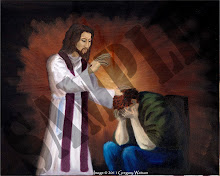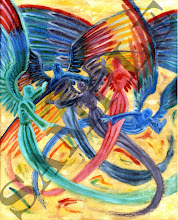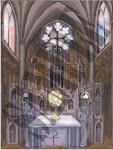The Glorious Mysteries of the Rosary bring our prayer and our Christian life full-circle. In our lives, the various trials, tribulations, and sufferings test our practice of the virtues, especially our faith, hope, and love. Every Rosary begins with three Hail Marys for the intention of growing in these three virtues, but the wisdom of the Rosary is shown that here, at the end of the chain, our very meditations are offered for the increase in these virtues, as we focus on and prepare for the end of our lives when we will obtain the promises of eternal life that the Rosary itself reminds us that Jesus offers to His servants and friends.
The First Glorious Mystery: The Resurrection of Jesus
For the Virtue of Faith
It almost seems counter-intuitive to start praying for the virtue of Faith here at the end of the Rosary's mysteries. Does not our spiritual life, our justification, our relationship with Jesus begin with faith? Absolutely! But Scripture teaches us that the just shall live by faith, not simply express their faith at some point in the past and have that settle the issue. Our Christian life begins with faith, but that faith must continue, grow, and develop throughout our lives. And when our world is shaken and our faith is tested, as through the sufferings that were the focus of the Sorrowful Mysteries, our faith must be revived and reinvigorated.
The Disciples themselves, having lived with Jesus for years, were still devastated at His death. The faith that they had built and nurtured barely survived the Crucifixion. It was in His Resurrection that their faith was restored and energised. They had faith when they first began walking with Him, but now their faith was solid and unshakable. So too our own faith must be strengthened as we meditate on Jesus' resurrection, and His very present reality in our own lives.
The Second Glorious Mystery: The Ascension of Jesus
For the Virtue of Hope
Where faith is about knowing Jesus, and focussing on His presence, here and now in our lives, the virtue of hope is future-focussed. Through the hard times, the suffering, the futile efforts to meet our daily needs and struggle through those moments when God seems to have abandoned us, hope keeps us looking forward, knowing that these hard times will not last. It keeps our eyes fixed on that often-dim speck of light in the distance. Without hope, we cannot move forward, for we stop believing that there is a forward toward which to move.
But hope, of course, depends on faith. For we must know and trust Jesus in order to hope in His promises. And so after meditating on His Resurrection in order to grow in faith, we ponder His ascension and increase our hope. We are able to cling tightly to the promise that Jesus knows us and has a plan for our good, so that we can endure the hardships of life without becoming beaten down. Like the sailor who navigates by the light of the North Star, we can maintain a steady course through the darkness.
The Third Glorious Mystery: The Descent of the Holy Spirit
For Deeper Love of God
Knowing Jesus and trusting His desire for our good, we can grow deeper in love with and for Him. Moreover, aided by that great Gift which He gave to us, in His Holy Spirit, who is the personified Love of God, filling us and strengthening us to live, serve, and love God, we grow into a deeper and more intimate union with Him. And that union with God overflows into deeper love and action on behalf of those whom He loves. As we come closer to God, we must of necessity become more loving of and concerned for our neighbour, the poor and needy among us. St. John tells us plainly, "If any man say, I love God, and hateth his brother; he is a liar. For he that loveth not his brother, whom he seeth, how can he love God, whom he seeth not? And this commandment we have from God, that he, who loveth God, love also his brother" (1 John 4:20-21). And so our deepening love for God compels us to action. If our love for God does not manifest itself in care for the needs of people around us, then we really do not love God. And so we come full-circle, and see why the Rosary is itself a loop. We never finish growing in love for God, and so we come right back to the beginning, seeking to become more humble and more loving of our neighbour. The process never ends until the end of our earthly lives.
The Fourth Glorious Mystery: The Assumption of Mary
For a Happy Death
And so we turn, in meditating on the end of the life of our dear Mother, and her glorious assumption into heaven, to considering our own manner of life and pray for a happy death. What does it mean to have a happy death? Is it merely one in which we die peacefully in our sleep surrounded by family and friends? I do not think that is the whole of it. As we learn from martyrs like St. Lawrence, the saint is perfectly happy to die even under horrendous circumstances, from an earthly point of view. But the Saint sees with the eyes of eternity, knowing that the glory to come surpasses the momentary suffering of life.
So, a happy death, it seems, is one that comes after a life of faithful service to God, having lived a life of virtue. It's one that is full of desire to be with Jesus and Mary in heaven above and beyond all the temptations and distractions of this world. When we seek a happy death, we are really praying for the grace to lead a life well lived, and to die in God's grace--whatever the physical circumstances of our deaths entail.
The Fifth Glorious Mystery: The Coronation of Mary
For Eternal Salvation
The final mystery of the Rosary leads us to focus on that final mystery of our life--the question of what lies beyond. Having faith and hope in Jesus, we believe His promise that He has prepared a place for us with Him, and our love for Him makes us desire to live worthy of being in His presence always. and so we pray for the grace of eternal salvation. Even as we strive to live a life of virtue, we remain conscious that we cannot presume to have been saved, but constantly acknowledge that our salvation is a gift from Jesus. At the same time, we hold in tension the great hope and confidence in His love for us and His desire to save us. We pray, then, with confidence, for that great, final gift.
And when we ponder the end of our lives and the great hope that we have in Christ, we take stock of our own lives. We see the faults and failings, the imperfection of our love, and desire to be even more faithful to Him. The last mystery of the Rosary thus leads us back to the first, as we continue to meditate on the lives of Jesus and Mary. The closer we grow to them, the more we desire to be like them. And the more we are like them, the more we recognise how much farther we have to go. And so we continue to pray, to meditate, and to strive to live lives worthy of the calling that He has given to us.
The chain of the Rosary stretches through the entirety of our lives, and the beads become footholds on our climb to Heaven. Held tightly in Our Lady's hand, we climb securely up the chain to her Son. So let us take up the Rosary daily as we progress onward in our faith. Let us, in the words of that famous closing prayer of the Rosary, meditate on its mysteries and imitate what they contain so that we may obtain what they promise.
And above all, let us ask Our Lady's intercession for us, now, and at the hour of our death. Amen.
Monday 17 September 2012
Subscribe to:
Posts (Atom)






